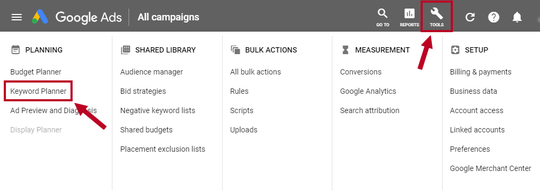The Foolproof Guide to SEO Keyword Research
Keywords are the words or phrases that pop up frequently on a web page, article, or blog post. These are the keywords that are typed in by the person searching for some specific information. The web pages, articles, and blog posts that contain the specific keyword(s) or keyword phrases appear in the search results. But getting your website or blog to rank higher for specific keywords is the real challenge that's faced by many business owners and marketers.
While Google has historically kept marketers and SEO experts on their toes by regularly releasing updates to its search algorithm, the one thing that has remained consistent in its importance is: keyword research.
Make a List
Before you can start using keywords, you will need to carry out keyword research. For that, you will have to make a list of the most targeted and relevant keywords based on your business, services, or products.
To start this process, think about the specific topics that you want to rank higher for on the search engines. Generally, you will come up with quite a few key terms that are relevant to your business. If you already have a large website or a blog, then these will be the topics that you have more information about on your website or blog.
If you are planning to create a website or start a blog, then the keywords or keyword phrases should be relevant to the product or service you provide or the topics that come up in sales conversations.
Make Good Use of the Tools Available
Before you decide to use SEO, you are going to need a plan of action. The good news is there are many tools that you can use to find the keywords that will get more traffic to your website. One of the best tools out there for SEO is by, of course, Google. Yes, we are talking about the Google Keyword Planner.
To get started with this tool, all you have to do is create your Google Ads account, which iis easy if you already have a Google account.
Once you've signed up, click on tools and Keyword Planner. Click on 'Find new keywords' and enter in the keyword you want to target to get all the available options.
Choose the Right Keywords
You're going to get many suggestions from keyword research tools - as such, you will have to choose the right keywords. These are going to be the keywords that will be most relevant to your business, services and niche. When choosing the right keywords or keyword phrases, it is important to remember that you do not need to use only the exact keywords.
Since keyword search tools or generators are likely to display hundreds of "relevant" keywords in their results, you do not want to go with the brain dump of keywords that may or may not attract potential customers or Google's algorithm. If you do not want to go through the process of curating keywords that are relevant to your business, then you can always hire professional blog writing services who will not only write the content for you but can also carry out extensive SEO keyword research.
Understanding Intent
Intent plays a major role in SEO keyword research. In fact, it wouldn't be wrong to say that user intent has become a crucial factor when it comes to search engines and SEO. The reason why user intent is pivotal to SEO keyword research is because the consumer of today has grown more demanding. They want their problems solved at a moment's notice, and to do that, they want to get the answers to their questions.
Similarly, the keywords that you target during your SEO keyword research should factor in the intent of the searcher, as in, what problem does the searcher want to solve when carrying out a search? Are they looking for a product or service in particular? Or do they just want information on a particular topic?
When choosing a list of keywords that you want to target, it pays to include different keywords that are relevant to the multiple intents of the searcher, and more importantly, how those keywords are going to be interpreted by the searcher. For that, it is important to create a customer persona by putting yourself in the shoes of all those who are more likely to search for your brand and relevant services you provide.
For instance, if you use the keyword phrase "content writing services." The word "content" can mean web pages, blogs, articles, social media posts, and so on. To target your customers, you will need to include all of the relevant keywords as part of your SEO strategy so that your website will appear for more targeted keywords being searched on Google or other search engines.
Factors to Consider when Choosing Keywords
The three main factors to consider when choosing keywords are:
Authority
It is a known fact that Google leans towards sources that it deems to be more authoritative on a particular subject or niche. This means, now more than ever, business owners and content creators need to grow into an authoritative resource where people can get relevant and credible information. This is why, along with SEO, other factors to consider include backlinks and social signals. But, it all comes down to the quality of the content you create, and not just the keywords. Quality content is more likely to be shared on social platforms and have a higher chance of creating more back linking opportunities.
Relevance
Google ranks websites based on relevance. This means that your content is only going to rank of a keyword if it meets the needs of the searcher. In short, your content needs to be the best resource for that specific query or keyword.
Volume
Aiming to rank for the first spot on the SERPs for a specific keyword is not the only challenge. If no one is going to search for that term, you are less likely to generate any traffic for your website. The volume of any keyword or keyword phrase is measured by the monthly search volume. This is the number of times that a specific keyword is searched for in a month.
There are many tools such as Google Analytics, Ubersuggest, SEMrush, Ahrefs, and so on that provide you with this crucial information so that you target the right keywords during your SEO keyword research.
Ending Note
At the end of your SEO keyword research, you should have compiled a list of specific and long-form keywords that you will target by creating content around those keywords and keyword phrases for your website or blog post.
This guest article was written by Dave Brown, a professional search engine optimization specialist and content writer who manages a team of search engine optimization experts and also offers content writing services.



